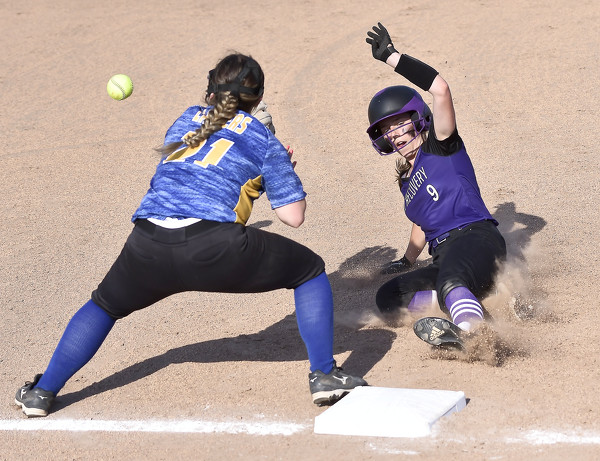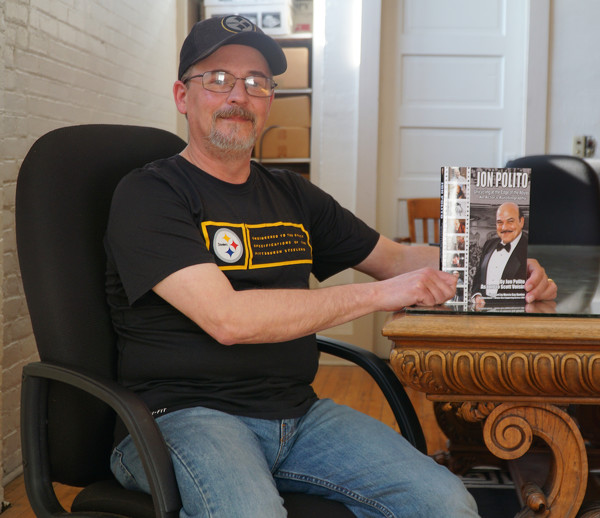Saturday, May 21st, 2022
Minster residents upset over drug test policy
By Leslie Gartrell
MINSTER - A school district administrator on Thursday night said the district's new random drug testing policy was spurred by a "surprising" amount of students who have talked about drug related activity over the past few years.
Roughly 100 school district residents attended an informational and sometimes turbulent meeting with superintendent Brenda Boeke, high school principal Austin Kaylor and Kyle Prueter, owner of Great Lakes Biomedical, which will conduct the testing.
Administrators said the new policy is intended to be preventative for students and give them another reason to "just say no" to drugs.
Parents and students in the audience questioned the necessity, efficacy, and privacy and procedural details of the policy, which will affect all students in sports, clubs and extracurricular activities. The policy was approved by the school board in April.
Students won't be subject to suspension or expulsion from school in the event of a positive test result, and positive results won't be shared with law enforcement or other third parties, Prueter said.
However, disciplinary action is possible for multiple positive test results, if parents refuse to complete a drug assistance program with their children or provide proof of medication for students whose medication could trigger a false positive test result.
In November, a representative from Great Lakes Biomedical, Perrysburg, gave a presentation to school board members about the random drug testing program, and in December board members authorized Boeke and Kaylor to draft a policy to implement the testing.
Boeke in December had said the idea for random drug testing came about during a quarterly principal and parent advisory meeting. Kaylor had said he consulted colleagues at other schools after the November presentation.
However, during Thursday's meeting Kaylor said he and school officials began to look into implementing a random drug testing policy after hearing stories of drug use among students from trusted staff members and students themselves.
In one example, Kaylor said a high school girl after a nasty break-up asked him to drug test her ex-boyfriend and his friends for marijuana. In another example, Kaylor said in 2019 a trusted staff member approached him and informed him a "troubled student" had made a list of students whom allegedly smoked marijuana after school.
"I see the names on the list, guys, and I'm flabbergasted," he told the audience. "I think the same thing you think about our kids - not here, no way."
Attendees erupted into a brief uproar, saying they were unsatisfied with a new policy they claimed would test nearly all students based on the allegations of a few people.
Kaylor said Minster Police Chief David Friend, who could not attend the meeting, supported the measure and believes the district is being proactive, especially with increasing use of synthetic marijuana and drugs being laced with fentanyl.
A school district coach in the audience also said he has heard more talk about drug use among his athletes in the past five years than in the entirety of his long-spanning career at the district.
Throughout the night, parents whispered among themselves, asked questions, gave their opinions and occasionally decried what they viewed as contradictory or unsatisfactory answers.
According to the policy, all students in grades 9-12 who are athletes, athletic managers/trainers/statisticians, band members including marching, concert and/or symphonic and any participants in clubs listed in the high school handbook would be subject to random drug testing.
Parents whose children are not in clubs or other activities could still opt-in their kids to the testing, but there is no option to opt-out. Staff and administrators would not be subject to the policy, Boeke said.
The cost is $17 per test, Prueter said. Boeke said the district will use $2,500 in student wellness funds for the tests each year, which are state funds specifically earmarked for student wellness activities.
The policy does not set a minimum or maximum amount of students who can be tested or a minimum or maximum amount of times a student can be tested. Students could be tested multiple times in a year due to the random nature of the testing, Prueter said.
Students would be tested on-site at the school using a urine sample and could be tested for LSD, marijuana, amphetamines, methadone, anabolic steroids, methaqualone, barbiturates, nicotine, benzodiazepines, opiates, cocaine, propoxyphene (Darvon) or any substance that's considered illegal to sell, purchase, give, exchange, use or distribute under state or federal law.
Testing also would reveal all prescribed and over-the-counter drugs being used in any way other than for medical purposes in accordance with the directions for use provided in the prescription or manufacturer, per the policy.
Students give a urine sample in a private stall by themselves, according to the policy. If a student cannot give a sample, they need to start drinking water, pop or juice in order to urinate. Students who can't produce a sample are kept in a secured area to wait until they can, the policy reads.
Whenever a test result indicates the presence of illegal drugs or banned substances, a parent or guardian is notified and the sample is sent to a lab for confirmation, Prueter, Great Lakes Biomedical owner, said.
If a student tests positive once, the principal will set up a meeting with the student and parents. Parents and guardians have two options the first positive test result: participate in an optional drug assistance program at the family's expense and agree to a retesting schedule for the student, or if they refuse, the student will be immediately denied participation in athletics and extracurriculars for one calendar year, according to the policy.
Students who test positive multiple times across their school career are subject to denial of participation for a full calendar year, or their entire high school career if they test positive more than four times, according to the policy.
Parents in the audience asserted nearly all students participate in some sort of sport or extracurricular activity. Some were concerned the drug testing policy could hinder participation rates, while others said they believed the policy is more of a scare tactic than prevention method.
Some questioned what the implication would be if the district repeatedly had no positive drug test results - would it mean the program is effective, or that there was no drug problem to begin with?
A handful of women in the audience said the urine testing experience could be distressing for their daughters if they are menstruating.
Other parents voiced privacy concerns, such as how long the company retains test results and who would have access to students' samples, how Great Lakes Biomedical will use their information and if they sell it to third parties.
Prueter said sample results are kept for only the school year. The labs which conduct the testing would have access to students' samples, he said, and Great Lakes Biomedical does not sell their information or provide it to third parties.
The next regular school board meeting is 7 p.m. June 20 in the elementary large group meeting room.


